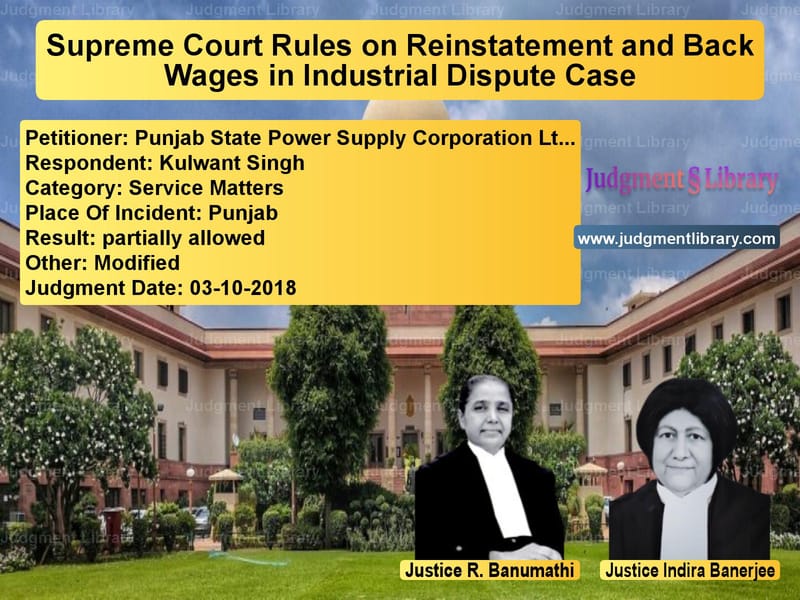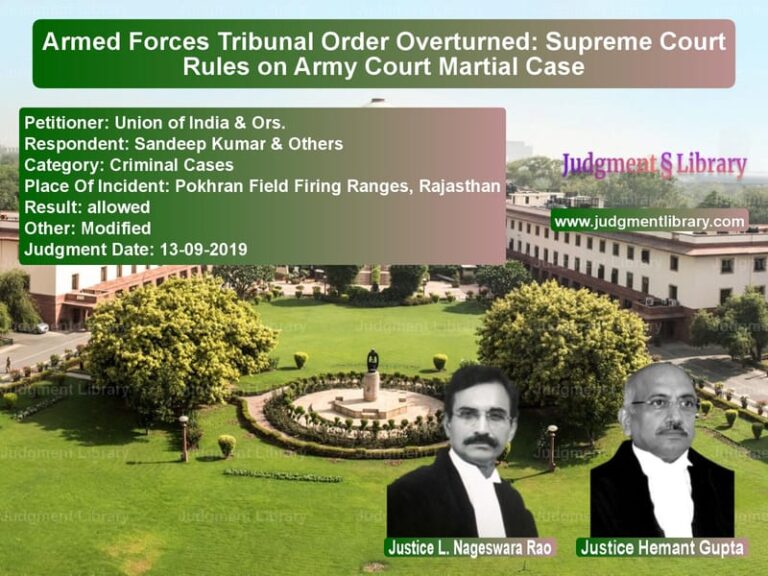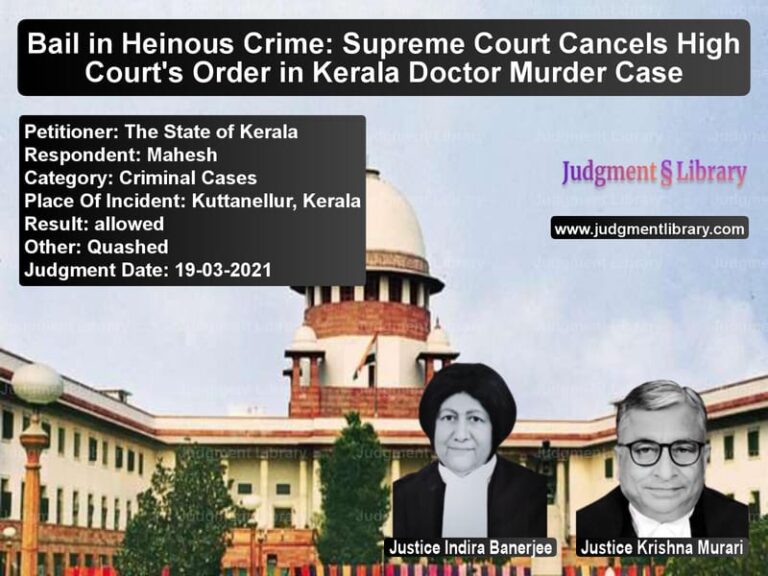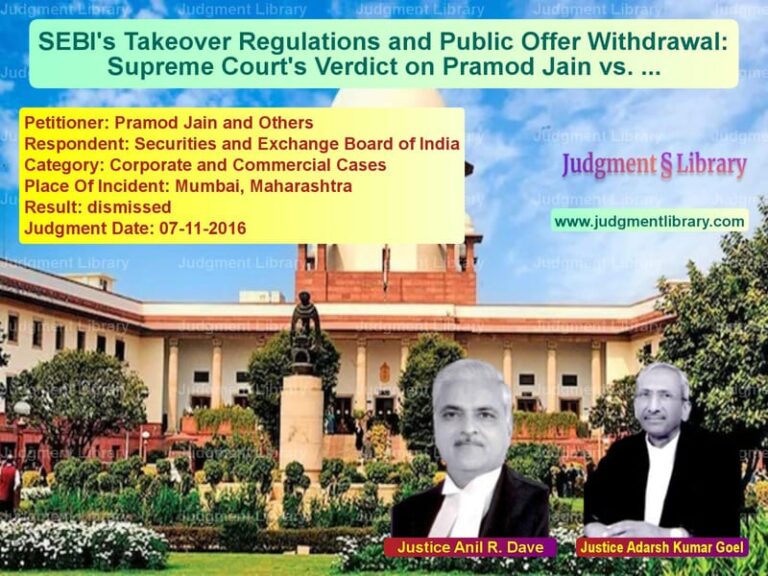Supreme Court Rules on Reinstatement and Back Wages in Industrial Dispute Case
The Supreme Court of India, in the case of Punjab State Power Supply Corporation Ltd. vs. Kulwant Singh, addressed a crucial issue in labor law concerning the reinstatement of daily wage workers and the award of back wages. The case involved the termination of a daily wage worker and the subsequent legal battle over whether he should be reinstated and whether back wages should be paid.
Background of the Case
The respondent, Kulwant Singh, was employed as a daily wage helper by the Punjab State Power Supply Corporation Ltd. (PSEB) in construction work from April 1997 to April 1998. His services were terminated in 1998 without proper compliance with Section 25-F of the Industrial Disputes Act, 1947, which mandates that a worker who has completed 240 days of continuous service cannot be terminated without due process.
The respondent challenged his termination by raising an industrial dispute before the Labor Court. The Labor Court ruled in favor of the respondent, holding that his termination was illegal and in violation of Section 25-F. The Tribunal ordered his reinstatement with continuity of service and awarded him 40% back wages. Dissatisfied with the decision, the employer, Punjab State Power Supply Corporation Ltd., challenged the award before the High Court.
Legal Issues Before the Supreme Court
- Whether the termination of the respondent’s service violated Section 25-F of the Industrial Disputes Act.
- Whether awarding 40% back wages was justified in the circumstances of the case.
- Whether reinstatement with continuity of service was the appropriate remedy.
Arguments by the Appellant
The appellant, Punjab State Power Supply Corporation Ltd., contended that:
- The termination was justified as the respondent was a daily wage worker employed for a specific project.
- The Labor Court and the High Court had erred in awarding 40% back wages, which placed an undue financial burden on the Corporation.
- The respondent’s employment was never permanent, and his role ended naturally with the project.
- Section 25-F should not apply as the respondent was not a regular worker but merely a temporary employee engaged on a need basis.
- The payment of back wages is not automatic and should be considered on a case-by-case basis.
Arguments by the Respondent
The respondent, Kulwant Singh, argued:
- His termination violated Section 25-F of the Industrial Disputes Act, as he had completed 240 days of service in the preceding year.
- The employer failed to comply with legal procedures before terminating his employment.
- Since he was illegally terminated, he had the right to reinstatement with continuity of service.
- The award of 40% back wages was necessary to compensate for the financial hardship he suffered due to unemployment.
- The High Court had correctly upheld the Tribunal’s decision, recognizing that unfair labor practices were involved.
Supreme Court’s Observations
The Supreme Court carefully reviewed the case and made the following crucial observations:
- “It is well settled that whenever there is a violation of Section 25-F of the Industrial Disputes Act, payment of back wages is not automatic.”
- “In this case, the respondent had been terminated in 1998, and awarding 40% back wages for nearly two decades would impose an excessive financial burden on the employer.”
- “Considering the peculiar facts and circumstances of this case, the Court deems it appropriate to modify the award of back wages while maintaining the reinstatement order.”
- “The respondent is entitled to reinstatement, but back wages must be reconsidered in light of financial hardship faced by both parties.”
Final Judgment
The Supreme Court ruled partly in favor of the appellant:
- The respondent’s reinstatement was upheld.
- The award of 40% back wages was modified to a lump sum compensation of Rs.1,50,000.
- The amount was to be paid within eight weeks.
- The judgment was not to be treated as a precedent for future cases.
Implications of the Judgment
The Supreme Court’s ruling provides significant guidance in labor law and industrial dispute cases. The following are the major takeaways:
1. Limited Scope of Back Wages
One of the major takeaways from this judgment is that back wages are not automatically granted when termination is found to be illegal. Courts must assess whether an employee has been gainfully employed during the intervening period and whether the employer’s financial condition allows for back wages.
2. Employer’s Financial Burden Considered
The Supreme Court acknowledged that reinstatement orders should not place an excessive financial burden on employers, particularly government institutions. Instead of ordering full back wages, courts can modify the award to ensure fairness.
3. Reinstatement as the Primary Remedy
The judgment clarifies that when an employee is terminated without following due process, reinstatement remains the primary remedy. However, monetary compensation is subject to judicial discretion.
4. Compliance with Section 25-F is Mandatory
The ruling reinforces that employers must follow due process before terminating employees, even if they are daily wage workers. Non-compliance with Section 25-F will make the termination illegal and subject to judicial review.
Conclusion
The Supreme Court’s ruling in Punjab State Power Supply Corporation Ltd. vs. Kulwant Singh underscores the importance of compliance with labor laws. While upholding the respondent’s reinstatement, the Court exercised judicial discretion in modifying the award of back wages, ensuring a fair balance between employee rights and employer financial constraints.
Petitioner Name: Punjab State Power Supply Corporation Ltd..Respondent Name: Kulwant Singh.Judgment By: Justice R. Banumathi, Justice Indira Banerjee.Place Of Incident: Punjab.Judgment Date: 03-10-2018.
Don’t miss out on the full details! Download the complete judgment in PDF format below and gain valuable insights instantly!
Download Judgment: Punjab State Power S vs Kulwant Singh Supreme Court of India Judgment Dated 03-10-2018.pdf
Direct Downlaod Judgment: Direct downlaod this Judgment
See all petitions in Employment Disputes
See all petitions in Public Sector Employees
See all petitions in Pension and Gratuity
See all petitions in Judgment by R. Banumathi
See all petitions in Judgment by Indira Banerjee
See all petitions in partially allowed
See all petitions in Modified
See all petitions in supreme court of India judgments October 2018
See all petitions in 2018 judgments
See all posts in Service Matters Category
See all allowed petitions in Service Matters Category
See all Dismissed petitions in Service Matters Category
See all partially allowed petitions in Service Matters Category







